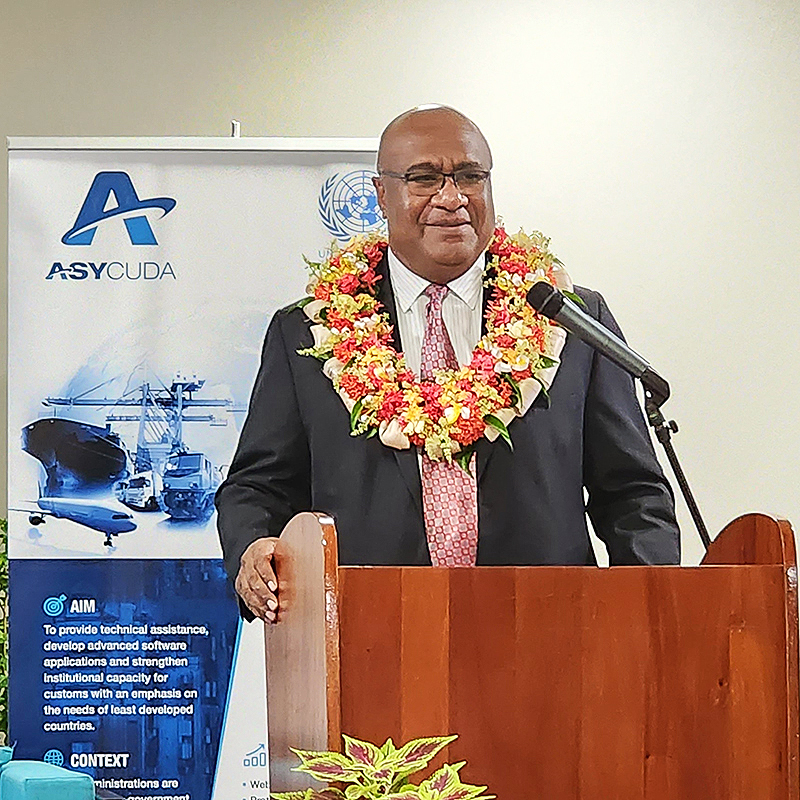
News
Blue Pacific Workshop Organized by ASYCUDA Programme Kicks Off

Customs officials and trade focal points from fifteen Pacific countries convened in Fiji to explore ways of achieving trade facilitation reforms through digitalization and cooperation among government agencies involved in trade.
The COVID-19 pandemic has accelerated the global digital transformation, and developing countries now face a more urgent need for connectivity and digitalization. This is crucial for Pacific Small Islands Developing States (P-SIDS) whose involvement in regional and international trade is limited by geography, small populations and domestic markets, scarcity of natural resources, and vulnerability to natural disasters.
In that context, the ASYCUDA Support Mechanism for the Pacific is a south-south cooperation initiative that leverages existing regional expertise to strengthen national customs operations. In addition, the Programme intervenes in all 15 islands within the context of two regional technical cooperation projects, under the PACER Plus Agreement and the PRISE Programme, to implement ASYCUDAWorld and improve customs clearance processes’ efficiency.
Organized by UNCTAD’s ASYCUDA Programme, the “Supporting Trade Facilitation, Digitalization and Digital Transformation in the Blue Pacific” workshop was opened by Fiji’s Deputy Prime Minister and Minister for Trade, Co-operatives and SMEs and Communications, the Honourable Manoa Kamikamica, UNCTAD Deputy Secretary-General, Mr. Pedro Manuel Moreno and Acting UN Resident Coordinator for Fiji, Solomon Islands, Tonga, Tuvalu and Vanuatu, Mr. Alpha Bah.
Speaking at the event, the Honourable Manoa Kamikamica said, “We recognise that, by streamlining our trade processes and reducing the time and cost of doing business, we can make Fiji a more attractive destination for trade and investment, and ensure that Fiji remains a competitive player in the global market”. He also recognized that improved trade facilitation cannot be achieved alone, adding that, “we need the support and expertise of technical experts and partners such as UNCTAD, to help us build the capacity and knowledge required to undertake trade facilitation reforms.”
Representatives from the Cook Islands, Federated States of Micronesia, Fiji, Kiribati, Marshall Islands, Nauru, Niue, Palau, Papua New Guinea, Samoa, Solomon Islands, Timor-Leste, Tonga, Tuvalu, and Vanuatu attended the workshop.
Recognizing the ASYCUDA Programme’s impact, Mr. Pedro Manuel Moreno highlighted that, “Tuvalu, after launching ASYCUDAWorld in December 2021 has reported a 20% increase in revenue collection due to improved transparency, compliance and efficient clearance”. Other impressive figures can be found in the recording of UNCTAD DSG’s opening statement to the workshop (please see below).
Customs officials and trade focal points from fifteen Pacific countries convened in Fiji to explore ways of achieving trade facilitation reforms through digitalization and cooperation among government agencies involved in trade.
The COVID-19 pandemic has accelerated the global digital transformation, and developing countries now face a more urgent need for connectivity and digitalization. This is crucial for Pacific Small Islands Developing States (P-SIDS) whose involvement in regional and international trade is limited by geography, small populations and domestic markets, scarcity of natural resources, and vulnerability to natural disasters.
In that context, the ASYCUDA Support Mechanism for the Pacific is a south-south cooperation initiative that leverages existing regional expertise to strengthen national customs operations. In addition, the Programme intervenes in all 15 islands within the context of two regional technical cooperation projects, under the PACER Plus Agreement and the PRISE Programme, to implement ASYCUDAWorld and improve customs clearance processes’ efficiency.
Organized by UNCTAD’s ASYCUDA Programme, the “Supporting Trade Facilitation, Digitalization and Digital Transformation in the Blue Pacific” workshop was opened by Fiji’s Deputy Prime Minister and Minister for Trade, Co-operatives and SMEs and Communications, the Honourable Manoa Kamikamica, UNCTAD Deputy Secretary-General, Mr. Pedro Manuel Moreno and Acting UN Resident Coordinator for Fiji, Solomon Islands, Tonga, Tuvalu and Vanuatu, Mr. Alpha Bah.
Speaking at the event, the Honourable Manoa Kamikamica said, “We recognise that, by streamlining our trade processes and reducing the time and cost of doing business, we can make Fiji a more attractive destination for trade and investment, and ensure that Fiji remains a competitive player in the global market”. He also recognized that improved trade facilitation cannot be achieved alone, adding that, “we need the support and expertise of technical experts and partners such as UNCTAD, to help us build the capacity and knowledge required to undertake trade facilitation reforms.”
Representatives from the Cook Islands, Federated States of Micronesia, Fiji, Kiribati, Marshall Islands, Nauru, Niue, Palau, Papua New Guinea, Samoa, Solomon Islands, Timor-Leste, Tonga, Tuvalu, and Vanuatu attended the workshop.
Recognizing the ASYCUDA Programme’s impact, Mr. Pedro Manuel Moreno highlighted that, “Tuvalu, after launching ASYCUDAWorld in December 2021 has reported a 20% increase in revenue collection due to improved transparency, compliance and efficient clearance”. Other impressive figures can be found in the recording of UNCTAD DSG’s opening statement to the workshop (please see below).




